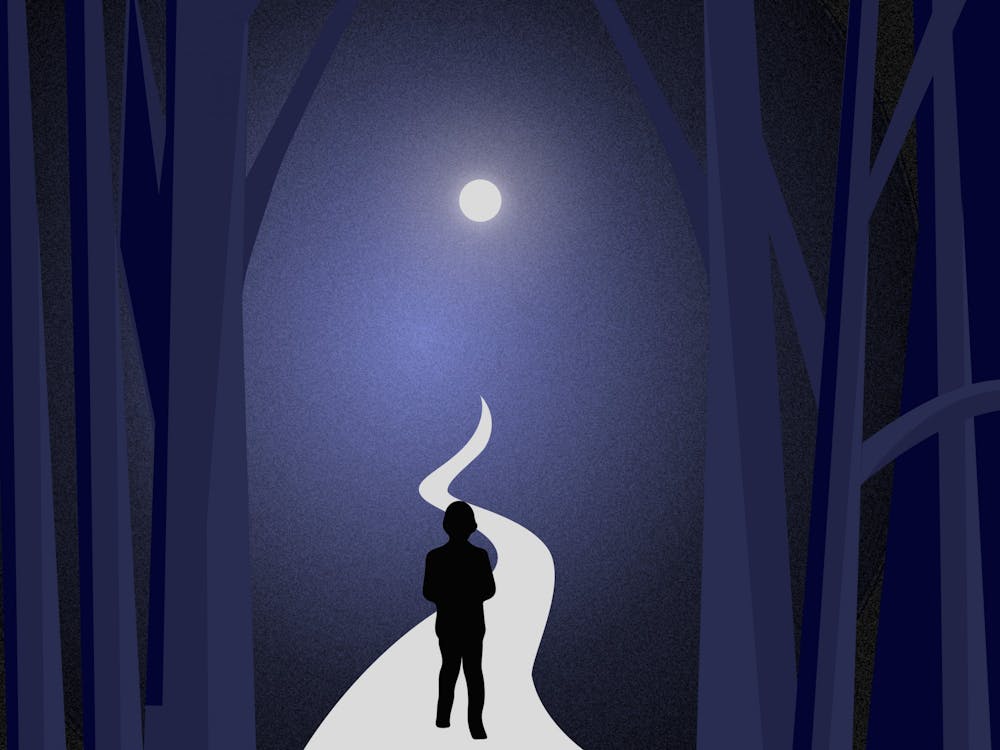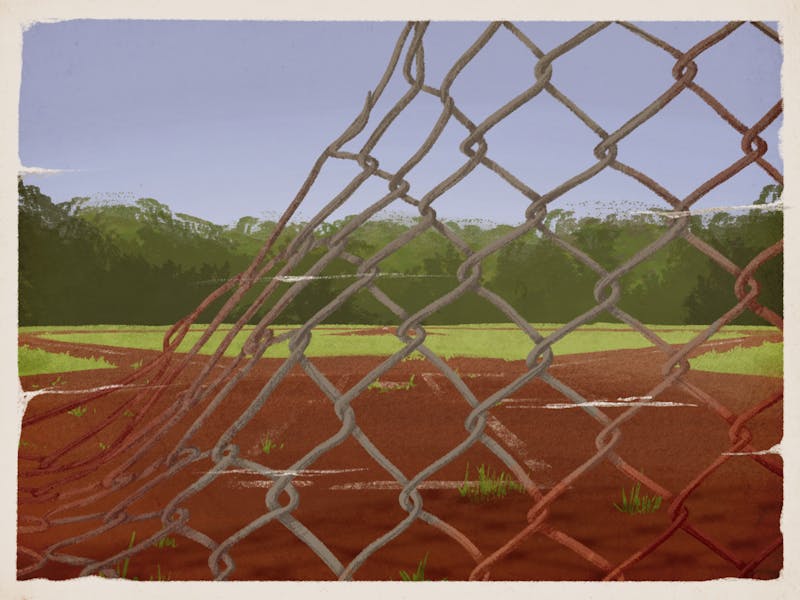And there was the old man who lived with his children in the middle of town, over his bakery that always sold fresh cookies and was always open to someone needing respite from a cold, windy day. There was the baker’s son who spent his time trying to capture the town’s beauty in pictures and paintings, and the baker's daughter who spent every night looking at the stars.
The boy’s home was a ghost town, but that didn’t matter to him. He had lived here all his life, watched as the neighboring houses had all filled with smiling people.
He had known each person. The couple in the red house loved to garden, planting all sorts of herbs and flowers on the little plot of dirt outside their home. The woman who lived alone a few streets down spent three weeks painting her house a bright yellow, all the while singing lullabies she had learned from her childhood. An old lady across the street would sit on her wraparound porch. When she heard the young woman singing, she would bring out her guitar from inside the house and give chords to the lady’s harmony.
As the boy ran through the streets of his hometown, he came to know each of these people, and they him. The old lady taught him the guitar, and he and the woman would sing duets. The old man always had a cookie and hot chocolate in a paper cup on the counter for him, and the son gave him paints and canvases of his own. The sister brought out a telescope for them to watch meteor showers. And the couple planted their most vibrant lavender in a pot and presented it to the boy, telling him how much water and sunlight it would need.
Then they had all left, one by one, leaving behind the lingering scent of lavender and homemade cookies. The boy had never figured out why they left, besides a lurking suspicion that people weren’t meant to stay in his town for long. It was a rest stop on a journey, not a destination in itself. But that had never meant anything to the boy. So he watered his lavender bunch and the garden the couple had left behind. He continued his walks through town, under power lines and through arrays of license plates all from different states, tossed to the side of the road.
He could feel the empty spaces where the others had once made their home. The town felt too big for him now, so the boy set out to make stories about the people who lived here, before him and before the people he knew. The docks became a place where pirates could find solace from the sea, a place where they could escape sirens’ calls. The little forest at the edge of town used to be home to talking animals and trees that could walk on their roots. The town square was where the farmer’s market would be every Sunday, where the townspeople would sell their homemade fruits and pies; but if you went into any of the dark alleys, you would find witches selling their brews and charms. And the hill–where the baker’s daughter would always set up to stargaze–was the place where celestial gods and goddesses would descend to Earth and grant the townspeople one wish every year.
It was after the boy started talking to himself about the town, making these stories, that the ghosts appeared to correct him. They ballooned out of crevices in the sidewalk and cracks in the house walls, coalescing to half-formed bluish shapes that the boy could barely tell were humanoid. Their voices were soft and barely distinguishable, but they would burrow deep into his brain, leaving images and thoughts as crisp as a cold, biting wind.
The docks never had pirates, the ghosts said, but some merchants visited from all over the world, bringing tales of adventure and woe with their sparkling jewelry and candied sweets. The trees in the forest could never walk, the ghost children whispered, but it was home to fields of dandelions so full you could make a wish just by breathing out the sweet air. The farmers market never had witches, but the baker would always sell the best pies and the apothecary would always be willing to give medicine so long as you gave their dog a treat. And though the hill never had ethereal, celestial beings, the townspeople would hold an annual festival there every fall, and everyone would don flower crowns and dance through the night.
The ghosts would tell the boy about other places in the town too. The house where the old lady had lived used to be the home of a glassblower, who could forge the most beautiful swans. The singing lady’s house was once owned by a mother of three children who had spent time with her kids painting it yellow until time and sunlight had bleached away the color. And the bakery used to be a library, home to many secret spaces and ways to spend a lazy day.
The ghosts told the boy even more. After all, the town had been lived in countless times over. But these were the stories that made the town feel whole to him again. He loved the ghosts’ company for the way it filled the empty town with noise again. Their whispers filled his head with a dull buzzing that could make his eyes glaze over as his feet remembered their usual route through town.
Years began to pass, though the boy only felt it because of the repetition of the seasons. He stopped making his own stories, instead walking aimlessly through town as the ghosts told theirs. As his head filled with more of the stories of the old town, he began to forget the faces and voices of his former neighbors, something he would feel guilty for. But then the ghosts would begin speaking in earnest, and his mind would let go of the feeling.
One day as the boy was walking through a route he took less often, listening to the ghosts talk about their days in the town, he spotted boxes he had never seen before. Walking off his path, he lifted one of the lids to find cans of spray paint. He vaguely remembered years ago when the baker’s son had gotten them in an attempt to learn more about every art form he could find. At once the boy bent down to pick up a can. Shaking it, he drew a line of red paint across the building he was in front of.
The line was jagged and dripped down like fresh blood, but as the boy set to making more, his hand became more sure. Shapes began to take form. He drew a sunset, the first thing the baker’s son had shown him to paint. When he was done, he drew a sea meeting the horizon, with a pirate ship floating on the waves and sirens just beneath the foam. The mural took him three days without rest, and when he was done, he moved to another building to make more.
The more he painted, the more memories came back to him: memories of learning guitar with the old lady, how to plant succulents with the couple, tracing constellations with the baker’s daughter. The daughter’s freckles, the baker’s laugh, the coils that always sat perfectly poised on the singing lady’s head. He drew all of these, each house a new canvas for him, and he imbued each memory with the stories he had heard and those he made up. Pictures of walking trees and fields of dandelions and glass swans and celestial beings making their homes with the stars. He should have run out of spray paint long ago, and he should have tired, but he wasn't. The ghosts didn’t give this town enough credit for the magic it could hold.
The boy worked on the murals nonstop for weeks, moving only when one wall was completely covered. When he finally finished, the sun was setting on a day long past his count. He walked to the top of the largest hill to view his work. The rays of light illuminated the painted walls of each house, haloing everything in a golden radiance. The town seemed more alive than it had in a long time, and the buildings seemed to be almost dancing in the colors he had draped them in.
It took the sun setting and the stars coming out for the boy to realize that the ghosts had stopped whispering. Which was fine with him, he realized. In the newfound quiet he thought that maybe it was time for him to leave too. This town had given much to him, but he had also given much to it. And besides, you couldn’t live with ghosts forever.
So the boy picked up the last can of spray paint, then walked over to the couple’s garden and picked up the pot with the lavender they had given him all those years ago. Then he marched to the edge of town, standing on the gravel road that stretched beyond for miles.
He turned back to face his old home one last time. In the light of the moon, all the colors he had painted were a muted gray, but the buildings still shone with a metallic sheen. It felt like he and the town were holding their breath.
“Take care of the garden,” the boy finally said, before turning around and taking his first step beyond the edge of town.
The moon washed the road in a pearly glow. He knew when he would eventually reach a fork in the road, the stars would give him the way. Follow the Polaris north, he could remember the baker’s daughter saying.
So the boy began walking, and he did not look back. After a few moments, he thought he could hear someone singing, a lullaby he may have once heard long ago as a child.



